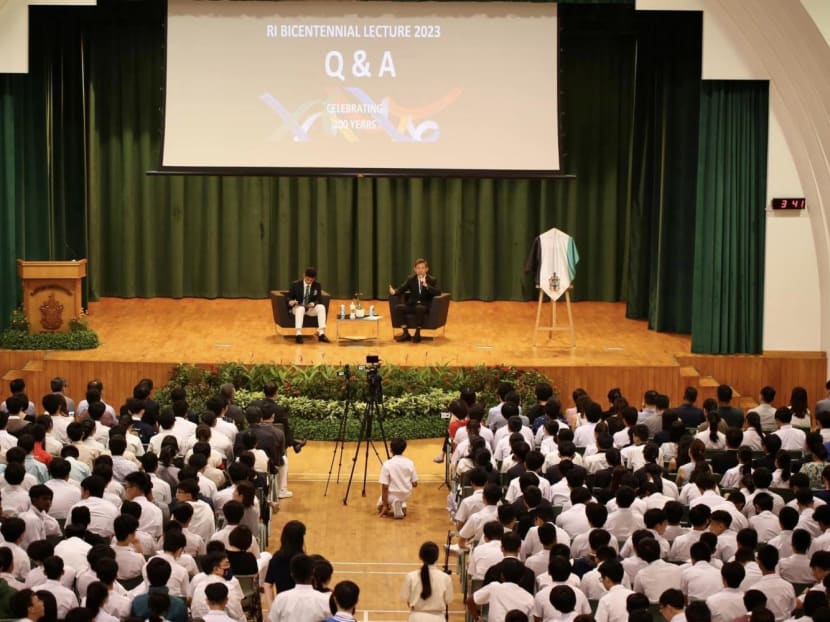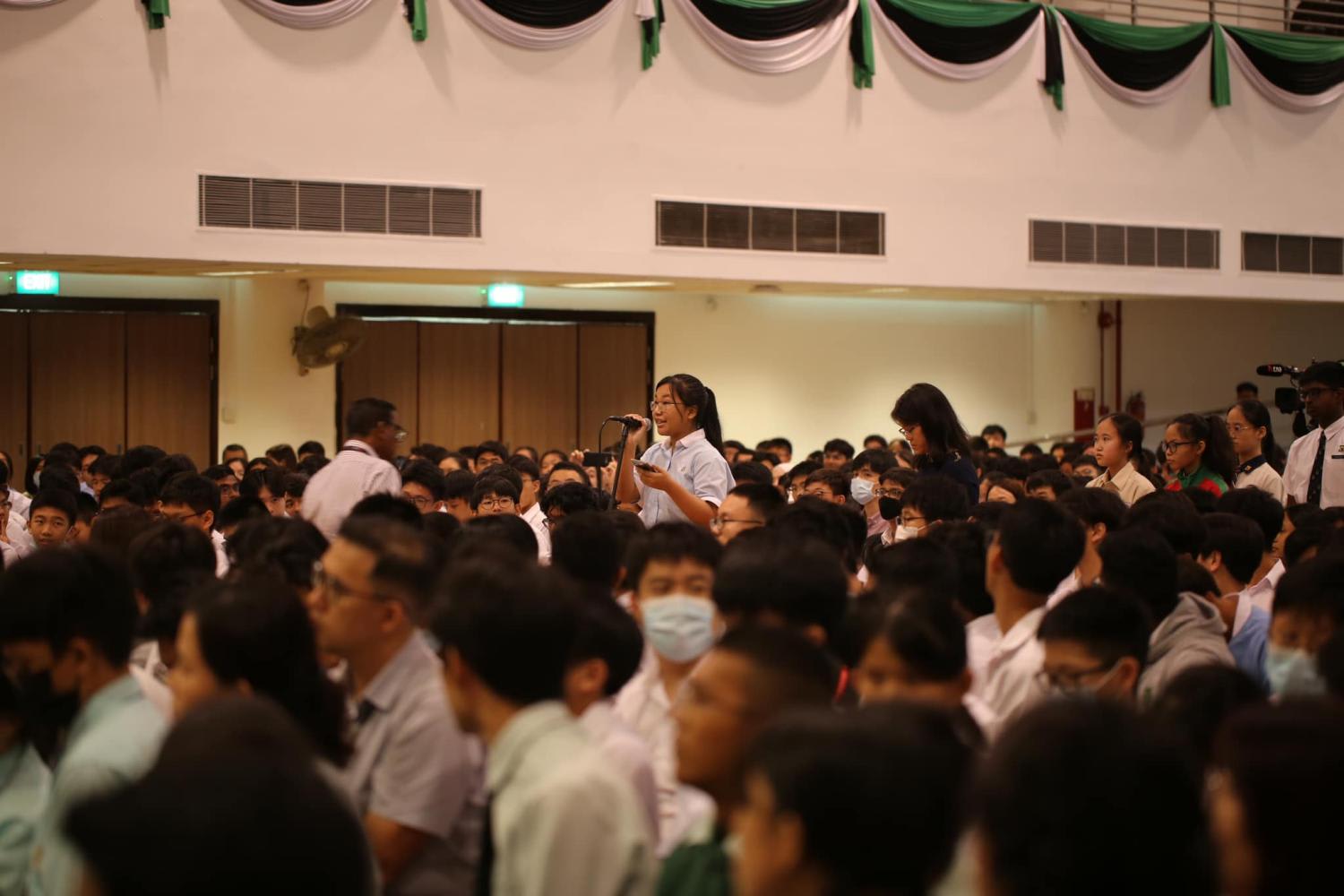Students quiz Chan Chun Sing, who urges RI to help 'bring out the best' in wider education system
SINGAPORE — Seven secondary students confidently strode to the microphone on Tuesday (May 16) before an audience of about 500 at one of the nation's most most well-known schools to pose a series of incisive questions to Education Minister Chan Chun Sing.

- Education Minister Chan Chun Sing delivered a speech at Raffles Institution (RI) for its Bicentennial Lecture on Tuesday (May 16)
- He spoke, among other things, about how RI’s “forward-looking ideas” must not benefit RI students alone, but more students across other schools too
- He said RI has a responsibility to bring others along, rather than separate themselves from the field
- Following his speech, seven students from different schools posed a series of questions to Mr Chan
- They spanned addressing educational disparities, and navigating the delicate balance between mental well-being and academic success, to forging a society that embraces and values all vocations
SINGAPORE — Seven secondary students confidently strode to the microphone on Tuesday (May 16) before an audience of about 500 at one of the nation's most well-known schools to pose a series of incisive questions to Education Minister Chan Chun Sing.
Their questions delved into a wide array of topical subjects, from addressing educational disparities, and navigating the delicate balance between mental well-being and academic success, to forging a society that embraces and values all vocations.
The minister gamely tackled the questions from the students who came from secondary schools such as Raffles Institution (RI), Ngee Ann Secondary School and Bartley Secondary School.
The exchange came during a question-and-answer session after Mr Chan delivered a speech for RI’s Bicentennial Lecture, a special edition of its annual RI Lecture on National Issues held in conjunction with the bicentenary of its founding.
During his speech of about 30 minutes, Mr Chan, an alumnus of the 200-year-old institution, touched on geopolitical tensions and Singapore’s place in the world, and the need to nurture leaders with the “gumption and vision” to step up in service of the Republic.
He also spoke about how RI’s “forward-looking ideas” must not benefit RI students alone, but more students across other schools too.
“RI has a responsibility to bring others along, not separate yourself from the field,” he said.
“RI teaches about 400 per cohort today. In the next bound, I'll like to imagine: What if your best practices can be propagated to benefit 4,000 or 40,000, beyond your students.”
Mr Chan added that many RI students are where they are today not just because of their own abilities, but also because of the help from others along the way.
“All of you must therefore recognise that you have more resources at your disposal compared to previous generations, greater opportunities afforded to you by society, and more extensive connections endowed by your network,” he said.
As such, Mr Chan said there is a “collective responsibility” to one another.
“So my challenge to you is to partner us to bring out the best in everyone, and to contribute to an education system that will enable everyone to progress farther, together.Education Minister Chan Chun Sing”
Aside from RI staff and students, there were about 330 upper secondary students and 70 accompanying teachers from 68 secondary schools in Singapore in attendance.

LOOK AT HOW YOU CAN CONTRIBUTE
This challenge laid down by Mr Chan solicited a question from an RI student, who said that the school is “naturally limited” in the range of possible engagements it can have with other schools.
He then highlighted some programmes that RI offers to its students, such as a gap semester, where Year 4 students can attend courses or work attachment programmes.
“Given this, how does the Ministry of Education, given its far greater influence and control over schools nationwide, plan to resolve this disparity of opportunities, and provide these opportunities for all students, to avoid inequality in our education system?”
The question drew a large round of applause from the audience.
In response, Mr Chan said it is about scaling, and this is where technology comes in.
“With technology, the best practices in RI can be scaled to anywhere in Singapore,” he said.
“Likewise, some of the best practices from across the world can be taught in RI…so never be constrained by the physical size and classes that we have.”
Mr Chan added that his “dream” is to have all schools in Singapore, more than 300 primary and secondary schools, to “create one distinctive idea” a year and share it around.
“We will probably have more good ideas than days of the year. And we can learn from one another. And there is no reason why we cannot have this,” he said.
On disparities, Mr Chan said there will always be a disparity in opportunities across society.
But the question, he said, is “what will we do as individuals to narrow this disparity?”
Giving an anecdote from his time as a Secondary 2 student at RI, Mr Chan said he and some of his friends from the Scouts co-curricular activity came together to tutor underprivileged children, some of whom had special needs.
“At Secondary 2, we knew no better and weren’t trained. But with a pure heart, we went forth to try and share and teach the underprivileged kids,” he said.
“That itself was a valuable lesson for us. That our achievement is not what we achieve in RI… Instead, (it’s about how) we can contribute.”
Mr Chan said Singapore will be a “much more heartwarming place”, if everyone defined success, not just by their achievements, but by their contributions.
RESPECTING EACH OTHER
Another question, from a Ngee Ann Secondary school student, related to a point Mr Chan made about how “schools must nurture leaders with the gumption and vision to step up in service of Singapore”.
The student said that it can be a “stressful process to step up as a leader for the good of the community”, and wanted to know how students can balance excellence in academia with their mental health and well-being.
Mr Chan said “with leadership comes responsibility”, and acknowledged that there will be trying times.
But he told the students to remember that when they are tired, they must recall their motive for being a leader.
“Is it because I want to shine… or because I want to make a difference in the lives of whom we serve?”
Mr Chan said leadership is not about telling people what to do, but walking the journey with them.
“Even if we don’t succeed, so long as we have made a difference, perhaps that is enough,” he said.
A student from Bartley Secondary School asked how Singapore’s education system can “serve to foster equal opportunities and recognition to all contributors of society”, such that, regardless of occupation, the individual is respected and fairly compensated monetarily.
To this, Mr Chan highlighted that one of the limitations of artificial intelligence systems such as ChatGPT, is that it cannot perform the “heart work”, which would include fields such as social work, or the “hand work”.
Therefore, he said the economy will need to have such individuals.
“My appeal to everyone is to respect each other for their different gifts, respect each other for their diversity, and recognise that it takes all of us with different abilities to build this country.”
Aside from these three questions, Mr Chan also responded to questions related to meritocracy, how education can partner artificial intelligence technologies, dual-citizenry, and what he thought the “best education system” would look like, without the constraints of resources.
On the last question, Mr Chan said “life will always have resource constraints”.
The most important element in an education system, he said, is not to teach students everything, but to teach them the ability to learn on their own.
ALWAYS WILLING TO HELP
Speaking to TODAY after the lecture, Old Rafflesians’ Association president Dennis Foo said that he welcomed Mr Chan’s call for RI students to help uplift their peers from other schools.
“I believe he recognises RI’s Dice initiative and wants to bring it to a national level and beyond,” said Mr Foo.
Dice is an acronym for diversity, inclusivity and community engagement, which are three broad principles RI took in 2018 to guide its programming approach.
According to Principal Frederick Yeo’s welcome message on the school’s website, the initiative's aim is to ensure that “highly capable students from less well-to-do families are not deterred from joining RI, just because they feel they may not belong here”.
Said Mr Yeo: “Our belief is that students from diverse backgrounds interacting together enriches the social learning environment of RI, deepens the learning of empathy, and strengthens our social compact.”
Ms Joyce Lim, the chairperson of the Raffles Parents' Association, and the mother of an 18-year-old Year Six RI student, said the school has always been willing to “help and share”.
The 52-year-old homemaker said RI has “adopted” 10 primary schools for a mentorship programme.
For that reason, she does not believe that Mr Chan’s call for Rafflesians to help others will dilute the exclusiveness of the school’s brand.











